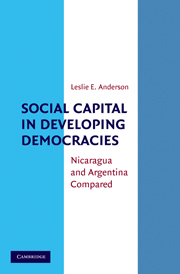Book contents
- Frontmatter
- Contents
- Preface
- 1 An Introduction
- PART I CREATING SOCIAL CAPITAL
- PART II AN EMPIRICAL EXAMINATION OF THE ARGUMENT
- 4 A Tale of Two Neighborhoods: Social Capital in Nicaragua and Argentina
- 5 Democracy and Its Competitors: Political Values in Nicaragua and Argentina
- 6 Participation, Democratic Institutions, and Procedures
- PART III MAKING DEMOCRACY WORK WITHOUT SOCIAL CAPITAL: INSTITUTIONAL CAPITAL
- 8 Conclusion
- Appendix
- Works Cited
- Index
5 - Democracy and Its Competitors: Political Values in Nicaragua and Argentina
Published online by Cambridge University Press: 05 June 2012
- Frontmatter
- Contents
- Preface
- 1 An Introduction
- PART I CREATING SOCIAL CAPITAL
- PART II AN EMPIRICAL EXAMINATION OF THE ARGUMENT
- 4 A Tale of Two Neighborhoods: Social Capital in Nicaragua and Argentina
- 5 Democracy and Its Competitors: Political Values in Nicaragua and Argentina
- 6 Participation, Democratic Institutions, and Procedures
- PART III MAKING DEMOCRACY WORK WITHOUT SOCIAL CAPITAL: INSTITUTIONAL CAPITAL
- 8 Conclusion
- Appendix
- Works Cited
- Index
Summary
Our political culture is different, our vision of democracy is distinct.
Peronist leader, speaking of his own partyThe political orientation of my Country should distance itself from all types of caudillismo …
Augusto C. Sandino, speaking to his people on the occasion of a proposed election, October 6, 1927If we want to trace the empirical connection between social capital and support for democracy, one place to begin is with political values, themselves the basis of actions. Such an examination can ascertain how fully citizens support democracy as opposed to some other authoritarian or less than fully democratic regime. This chapter examines political values in these two nations, looking at liberal democratic, radical democratic, and non-democratic values in Nicaragua along with democratic, authoritarian, and clientelistic political values in Argentina.
The empirical bases for this chapter are several. First, we introduce two historical data bases which facilitate the study of political values at the national level. In each country we are fortunate to have a large data base of public opinion drawn from the late 1990s at a time when the memory of a previous, non-democratic regime was much more recent than it is today. In the late 1990s many Nicaraguans could easily remember the authoritarian Somoza dictatorship while many Argentines could likewise remember the brutal military dictatorship of 1976–1983. Asking questions about political values that draw upon data from that time period allows us to compare the loyalties of respondents to non-democratic regimes in a way that would be much more difficult today.
- Type
- Chapter
- Information
- Social Capital in Developing DemocraciesNicaragua and Argentina Compared, pp. 138 - 171Publisher: Cambridge University PressPrint publication year: 2010

